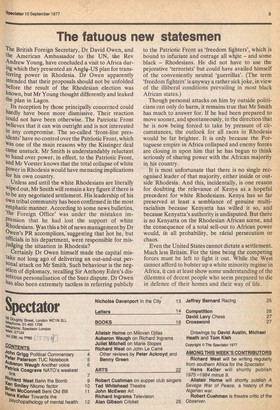The fatuous new statesmen
The British Foreign Secretary, Dr David Owen, and the American Ambassador to the UN, the Rev Andrew Young, have concluded a visit to Africa during which they presented an AngI9,-US plan for transferring power in Rhodesia. Dr Owen apparently intended that their proposals should not be unfolded before the result• of the Rhodesian election was known, but Mr Young thought differently and leaked the plan in Lagos.
Its reception by those principally concerned could hardly have been more dismissive. Their reaction Could not have been otherwise. The Patriotic Front believes that it can win outright and is not interested in any compromise. The so-called 'front-line presidents' have no control over the Patriotic Front, which Was one of the main reasons why the Kissinger deal Came unstuck. Mr Smith is understandably reluctant to hand over power, in effect, to the Patriotic Front, and Mr Vorster knows that the total collapse of white Power in Rhodesia would have menacing implications for his own country.
Unless and until the white Rhodesians are literally Wiped out, Mr Smith will remain a key figure if there is to be any negotiated settlement. His leadership of his own tribal community has been confirmed in the most emphatic manner. According to some news bulletins, the Foreign Office' was under the mistaken impression that he had lost the support of white Rhodesians. Was this a bit of news management by Dr °wen's PR accomplices, suggesting that hot he, but officials in his department, were responsible for misjudging the situation in Rhodesia?
Certainly Dr Owen himself made the capital mistake not long ago of delivering an out-and-out pers°flal attack on Mr Smith. Such behaviour is the negation of diplomacy, recalling Sir Anthony Eden's disastrous personalisation of the Suez dispute. Dr Owen has also been extremely tactless in referring publicly to the Patriotic Front as 'freedom fighters', which is bound to infuriate and outrage all white and some black Rhodesians. He did not have to use the pejorative 'terrorists' but could have availed himself of the conveniently neutral 'guerrillas'. (The term 'freedom fighters' is anyway a rather sick joke, in view of the illiberal conditions prevailing in most black African states.)
Though personal attacks on him by outside politicians can only do harm, it remains true that Mr Smith has much to answer for. If he had been prepared to move sooner, and spontaneously, in the direction that he is now being forced to take by pressure of circumstances, the outlook for all races in Rhodesia would be far brighter. It is only because the Portuguese empire in Africa collapsed and enemy forces are closing in upon him that he has begun to think seriously of sharing power with the African majority in his country.
It is most unfortunate that there is no single recognised leader of that majority, either inside or outside Rhodesia. And this, incidentally, is one reason for doubting the relevance of Kenya as a hopeful precedent for white Rhodesians. Kenya has so far preserved at least a semblance of genuine multiracialism because Kenyatta has willed it so, and because Kenyatta's authority is undisputed. But there is no Kenyatta on the Rhodesian African scene, and the consequence of a total sell-out to African power would, in all probability, be racial persecution or chaos.
Even the United States cannot dictate a settlement. Much less Britain. For the time being the competing forces must be left to fight it out. While the West cannot afford to bolster up a white minority regime in Africa, it can at least show some understanding of the dilemma of decent people who seem prepared to die in defence of their homes and their way of life.






























 Previous page
Previous page